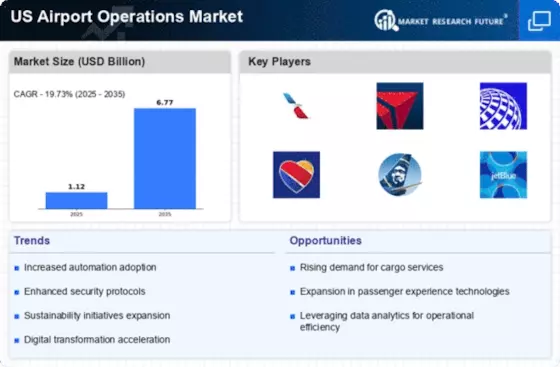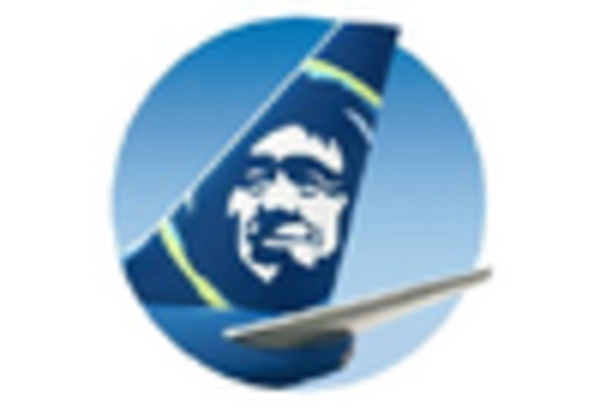Increased Air Travel Demand
The US Airport Operations Market is experiencing a surge in air travel demand, driven by a growing economy and increased consumer confidence. In 2025, the number of domestic air travelers is projected to reach 900 million, reflecting a robust recovery in the aviation sector. This increase in passenger volume necessitates enhanced airport operations to accommodate the rising demand. Airports are likely to invest in expanding terminal capacities and improving infrastructure to ensure efficient passenger flow. Additionally, airlines are expected to increase flight frequencies, further contributing to the operational complexities faced by airports. This growing demand presents both challenges and opportunities for the US Airport Operations Market, as stakeholders must adapt to the evolving landscape of air travel.
Technological Advancements in Operations
Technological advancements play a pivotal role in shaping the US Airport Operations Market. Innovations such as automated baggage handling systems, advanced security screening technologies, and real-time data analytics are transforming airport operations. In 2025, it is estimated that airports will invest over $2 billion in technology upgrades to enhance operational efficiency and passenger experience. These technologies not only streamline processes but also reduce operational costs in the long run. Moreover, the integration of artificial intelligence and machine learning in airport management systems is expected to optimize resource allocation and improve decision-making. As airports continue to embrace these technological advancements, the US Airport Operations Market is likely to witness significant growth and improved service delivery.
Regulatory Compliance and Safety Standards
The US Airport Operations Market is heavily influenced by stringent regulatory compliance and safety standards. The Federal Aviation Administration (FAA) mandates various safety protocols that airports must adhere to, ensuring the safety of passengers and staff. Compliance with these regulations not only enhances operational efficiency but also fosters public trust in air travel. In 2025, the FAA allocated approximately $3 billion for airport safety improvements, indicating a strong commitment to maintaining high safety standards. This investment is likely to drive operational enhancements across the industry, as airports strive to meet and exceed these regulations. Furthermore, the emphasis on safety may lead to increased operational costs, but it is essential for the long-term sustainability of the US Airport Operations Market.
Sustainability and Environmental Considerations
Sustainability initiatives are becoming increasingly important within the US Airport Operations Market. Airports are under pressure to reduce their carbon footprints and implement environmentally friendly practices. In 2025, it is anticipated that airports will invest approximately $1.5 billion in sustainable infrastructure projects, such as solar energy installations and green building certifications. These initiatives not only align with global sustainability goals but also enhance the public image of airports. Furthermore, the adoption of electric ground support equipment and sustainable aviation fuels is expected to gain traction, contributing to the overall reduction of greenhouse gas emissions. As environmental considerations become more prominent, the US Airport Operations Market is likely to evolve towards more sustainable operational practices.
Public-Private Partnerships in Infrastructure Development
Public-private partnerships (PPPs) are increasingly shaping the landscape of the US Airport Operations Market. These collaborations between government entities and private companies facilitate the development and modernization of airport infrastructure. In 2025, it is projected that PPPs will account for nearly 30% of total airport investment, amounting to approximately $4 billion. This funding model allows for the sharing of risks and resources, enabling airports to undertake large-scale projects that may have been financially unfeasible otherwise. Additionally, PPPs can lead to innovative solutions and improved operational efficiencies, as private entities often bring expertise and technology to the table. As the demand for modernized airport facilities grows, the role of public-private partnerships in the US Airport Operations Market is likely to expand.
















